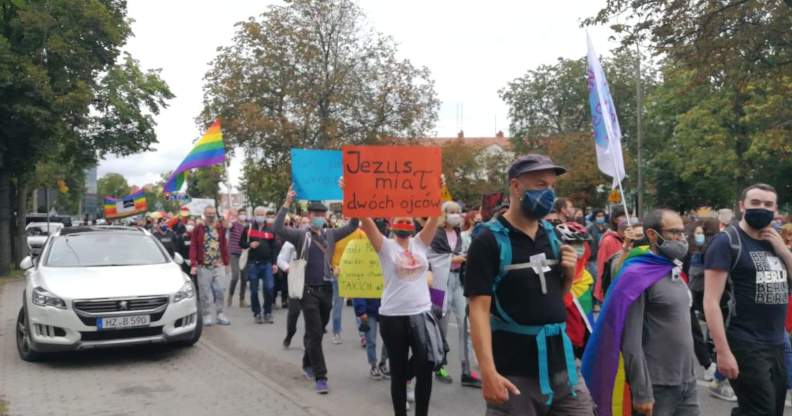Thousands march from Germany to Poland in powerfully symbolic cross-border LGBT+ rights protest

A queer rights protest at the border between Poland and Germany (Magazyn LGBTQIA Replika/Twitter)
An LGBT+ rights protest at the Poland-Germany border has shone a light on the growing disparity between the two nations on queer issues.
While Germany has progressed significantly on LGBT+ rights in the past few years, introducing same-sex marriage and banning conversion therapy, the picture is far bleaker in Poland – where nationalist politicians have fuelled a rise in public homophobia and anti-LGBT+ extremism.
Around 2,000 demonstrators stood up to homophobia on Saturday (September 5) with a protest held jointly by activists in the closely-connected border towns of Slubice, Poland, and Frankfurt an der Oder, Germany, which are separated by a symbolic bridge across the River Oder.
German protesters carried signs and banners expressing their love for their LGBT+ Polish neighbours, as the groups marched across the border.
Gestern dann mal die Abwechslung zu #b2908 – Die erste Doppelstadt Pride von Slubice nach Frankfurt Oder.
Sehr guter Artikel von @hugo_greenhalgh dazu.#pride #FrankfurtOder #slubiceffopride #HappyPride pic.twitter.com/tJlp8agp2H
— Justus (@that_justus) September 6, 2020
“This is our response to what is happening in other parts of Poland, where LGBT-free zones are being created,” Kacper Kubiak of the Institute of Equality told Gazeta Lubuska.
Mewa Topolska, a teacher from Slubice and one of the organisers of the march, told Reuters: “The only way we can change people’s opinions is through visibility.
“We don’t have full queer rights in Poland — and won’t for a long time so the main [aim of the march] is solidarity with the Polish side.”
Stella, a care worker in Frankfurt an der Oder, told the outlet: “No one should judge people according to their race, religion or [sexuality]. We are all born different and we don’t choose how we are born.”
A handful of counter-protesters turned up on the Polish side of the border, Reuters reports, bringing with them a van daubed with anti-LGBT+ slogans.
"Wir wollen zeigen, dass wir existieren." Deutsche und Polen haben in #Slubice und #Frankfurt (Oder) gemeinsam gegen sogenannte "#LGBT-freie Zonen" demonstriert. #slubiceffopride #lgbtq #lgbtiq pic.twitter.com/sPrNjHUV3q— rbb|24 (@rbb24) September 5, 2020
Politicians have repeatedly stoked anti-LGBT+ hatred in Poland.
LGBT+ people are a popular punching bag for Poland’s conservative government, with right-wing president Andrzej Duda narrowly winning re-election in July after making homophobia one of the core planks of his campaign.
In a “family charter” published ahead of the election, Duda pledged to “prohibit the propagation of this ideology” in public institutions and “defend the institution of marriage” as defined as a “relationship between a women and a man”.
With days to go until the run-off vote, Duda also proposed an amendment to Poland’s constitution that would ban same-sex couples from adopting children. He said: “I am convinced that, thanks to this, children’s safety and concern for the good of children will be ensured to a much greater extent.”
As part of the politically-driven attack on LGBT+ people, nearly 100 Polish municipal or local governments have proclaimed themselves zones “free from LGBT+ ideology” and opposing gay “propaganda” — covering nearly a third of the country.
The European Parliament passed a resolution that strongly condemned the concept of LGBT-free zones in December, noting that they are “part of a broader context of attacks against the LGBT+ community in Poland, which include growing hate speech by public and elected officials and public media, as well as attacks and bans on Pride marches”.

